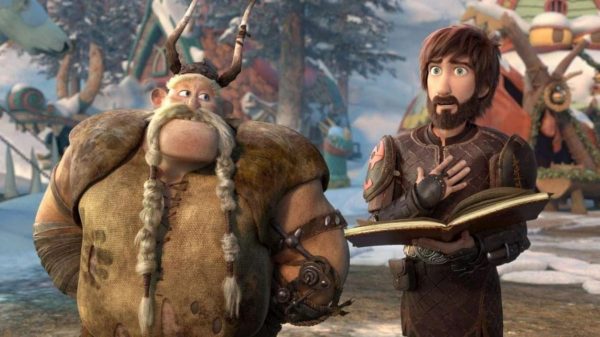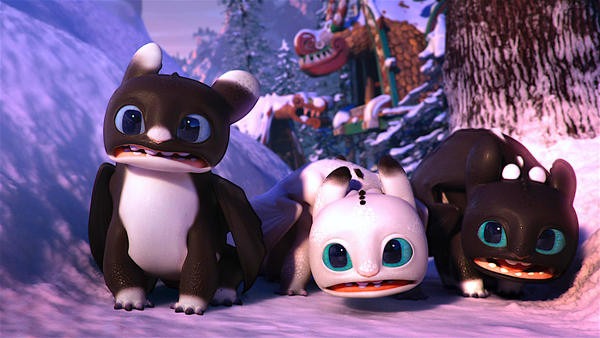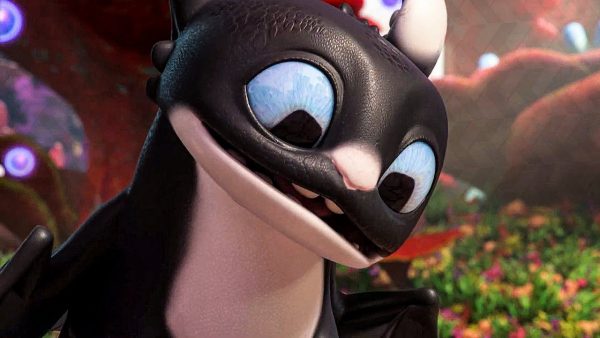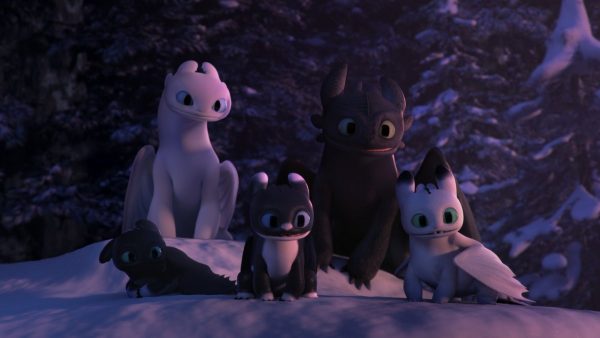Every December, there is one thing people can count on seeing on television, the feel good holiday specials and movies. This year is no different with CBS’ A Home for the Holidays with Idina Menzel, FX’s A Christmas Carol, Netflix’s Klaus, Disney+’s Noelle and ABC’s Same Time, Next Christmas to name a few. Another special worth mentioning is the heartwarming How to Train Your Dragon: Homecoming, which premiered on NBC and can now be seen on Hulu all month long.
The latest installment of the beloved Dragon franchise takes place ten years after the end of How to Train Your Dragon: The Hidden World. It opens with Hiccup and Toothless sharing stories of their special relationship with their respective families as they prepare for the Snoggletog Festival. When it becomes clear that the new generation of Vikings doesn’t remember the bond between dragon and human, Hiccup makes a plan to celebrate dragons with a grand holiday pageant. This feel good idea leads to a series of hilarious and exciting events, but no matter the circumstance, everyone in New Berk – young and old alike – is reminded that dragons and humans are forever bonded.
One of the many aspects that always stands out about the How to Train Your Dragon projects are the incredible scores by John Powell. Even though Powell did not work on Homecoming, it was done by Anthony Willis, the score is equally enchanting. Willis does a very nice job of honoring Powell’s themes, while putting his own emotional stamp on the beloved characters. Willis is no stranger to the franchise; he has contributed additional music to How to Train Your Dragon 2 and How to Train Your Dragon: The Hidden World under Powell. He has also contributed music to other recent projects such as Jumanji: The Next Level, The Elephant Queen and Ralph Breaks the Internet. We spoke with Willis about his latest work on Homecoming below.
Can you tell us how you got involved with the holiday special How to Train Your Dragon: Homecoming?
Like many film and music lovers, I was blown away by John Powell’s beautiful score for How to Train Your Dragon in 2010. It was everything I dreamed of being a part of and more. I was very lucky to meet John a few years later, around the time he was gearing up to score How to Train your Dragon 2. Following some slightly ropey tennis, I found myself in the incredibly fortunate position of supporting him as an additional composer, which was absolutely a dream come true. To be a fly on the wall of John’s process has been one of the most rewarding experiences of my musical life, and I’d say through his great support and teaching, I really began to find myself as a composer on that film. After the Hidden World, I thought that my journey on Dragons was coming to an end, but John generously recommended me to score this wonderful project, HTTYD Homecoming.
John Powell has scored all of the “How to Train Your Dragon” films. How have you put your own mark on this story, while still honoring John’s score?
My score is very much a tribute to everything I love about the musical world that John created, and so I didn’t approach this as an opportunity to enforce my own voice on the story, but for better or worse, my own footprints have inevitably come out. The new ideas explored in Homecoming of nostalgia, honouring the past, faith in Dragons and adolescent mischief gave me the opportunity to explore some new ground which I think does give the score a distinct character within the context of the franchise.
How would you describe your score for How to Train Your Dragon: Homecoming?
Overall, I would describe it as soulful and playful, and while there are some majestic moments of granduer, the narrative is on a smaller more intimate scale than the features. After the dramatic conclusion of The Hidden World, probably the most interesting thing about scoring this film, is the question of what life will now be like for the Vikings of New Berk, and the Dragons on whom they had grown to depend. I was very fortunate to have the opportunity to spot the film with John, and director Tim Johnson, who suggested that a new central melody for “Memory’ would be a great way to anchor this nostalgic aspect. I therefore tried to compose this in such a way that it would evoke the spirit of the musical world that John created, and integrate effectively with the existing themes that he composed for the trilogy. The Memory theme is featured throughout the score in a number of guises, and is often orchestrated for Alto Flute in the most intimate moments, for its beautiful soulful quality.
Another lovely aspect of this new story, is the introduction of the next generation of Vikings and Dragons, specifically Zephyr, Nuffink and the three Nightlights (Baby Furies). For the Nightlights I had the opportunity to create a new adventure theme, exploring a playful and mischievous palette with Piccolo, Dulcimers, and African Percussion, that references some of the mysterious exotism John explored for Tootheless in Dragon 1, but adapting these colours from danger to playful and fun.
Thanks to John’s support, I wrote and produced the score at 5 Cat Studios, his state-of-the-art production facility in Los Angeles. The music also features the vocal talents of 5 Cat’s in-house songwriters ‘Karmina’, who performed the ethereal pop vocals to support some of the more emotional and intimate scenes. I was also very fortunate to record the orchestra at AIR Studios, the birthplace of the How to Train Your Dragon scores. The score was recorded and mixed by 5 Cat’s in-house engineer John Traunwieser, and so it’s very much been a 5 Cat Studios production.
Which character in the special did you most enjoy scoring for? Why?
The lead protagonist in Homecoming is Hiccup and Astrid’s young daughter, Zephyr. Much like her grandfather Stoick, she’s fiercely stubborn and cynical. After finding the Book of Dragons, a chronicle of their more dangerous characteristics, she struggles to envisage the friendship that Vikings and Dragons once had. Musically, Zephyr therefore inhabits John’s brilliant Dragon and Viking tunes for much of the story which gives us a ‘uh oh, here we go again’ feeling. However, there is a beautiful moment towards the end of the special, in which she has something of a spiritual encounter, where she finally understands everything Hiccup has been trying to teach her, an important throwback to when Hiccup first bonds with Toothless in Dragon 1. It’s the most emotional moment in the film, and scored very intimately with Alto Flute and Ethereal Pop Vocals, before flourishing into a large orchestral climax.
How involved was director Tim Johnson with the score for How to Train Your Dragon: Homecoming?
Tim was very involved and integral to the score’s creation. He is a passionate musician himself, and as a longtime director at DreamWorks Animation, he’s steered the course of a number of the studios’ great scores, including Antz & Sinbad. And so, I was really fortunate to have this opportunity to work with him, and lean on him as a creative compass. In spite of his legendary status, and mine as a younger composer, he was incredibly respectful from day one, and knew exactly how to guide me. After we spotted the film, in December last year, I came over to Dreamworks after and played him the new Memory Theme on an old piano they have over there, so we started old school :). As animation progressed, I began to present him cues at JP’s 5Cat Studios, and the process went from there! Tim also worked very hard for us to be able to record the score for Homecoming at Air studios in London, where the majority of his scores have been recorded, and so it’s largely because of him that we have such wonderful performances on the soundtrack.
Since this is a holiday special, did you incorporate any familiar holiday/Christmas tunes in your score? If not, what did you do to give it a holiday vibe?
Celtic & Folk music share a lot of similarities to traditional Christmas carols, so the world of How to Train Your Dragon is already well suited to the holiday sound. But it wouldn’t be a holiday movie without a good dose of sleigh bells and celeste to support the Vikings as they celebrate Snoggletog! Because the world of New Berk is a mythological one, and the story of Homecoming very much an offspring of the features, it didn’t feel appropriate to incorporate any traditional holiday tunes in Homecoming. However, there are some Celtic arrangements of Christmas carols to be heard in the Snoggletog Log which is available on Hulu.
Do you have a favorite How to Train Your Dragon film, musically?
Each of John’s Dragon scores are so beautiful in their own way, and like the films, all cover a slightly different emotional perspective. But if I had to pick I’d have to say Dragon 2. John captured the theme of ‘lost and found’ in a way that really resonated with me. Overall John’s prescription of themes is really impactful and sophisticated, typically attaching melodies to concepts, such as loss, or freedom, as opposed to specific characters. That way these themes can modulate through different characters’ experiences in a variety of guise and variations, but also as an emotional through line.
Do you think originally being from London and starting school there gave you a different perspective on the music industry and Hollywood?
Yes, I suppose that we all can’t help but see things a little differently depending on where we’re from, and what we’ve grown up with. For me, and I think for many people, Hollywood is an ideal to strive for, where the best stories are being told in the best possible ways. When I arrived here, I certainly didn’t estimate how much the business would be changing, because it always seemed so timeless from afar, so I don’t know that any perspective I had then matters much now! In so far as coming from England, I think I’ve certainly benefited from having a strong musical training as a chorister when I was young, and the deep love of music I developed there has been essential I think.
Many thanks to Anthony Willis for taking the time for this interview. The How to Train Your Dragon: Homecoming score is available now here.
















